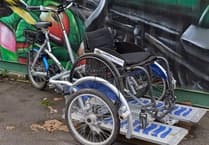Higher taxes and more stretched services are expected in Bath and North East Somerset as the council warns it must make “extremely challenging” efficiencies to fill a £35m budget black hole over the next five years.
Bath and North East Somerset Council’s cabinet member for resources, Mark Elliott, said: “With services that are already stretched, the efficiencies required are extremely challenging, however, I want to reassure residents we have the capability and expertise to manage this situation.”
A council tax hike of the maximum permitted is once again likely for people living in the council area. Last year saw Bath and North East Somerset Council increase their share of council tax by 4.99% — of which two percentage points are ring fenced for adult social care funding — and an expected rise of the same percent next year has already been factored into the council’s figures.
For the 2024/25 financial year — which the council will set the budget for in February — the council will need to cut 12% of the estimated £143.2m budget. That means the council needs to find £17.3m to balance the books. Savings of £0.7m have been identified so far.
The figures are included in the Medium Term Financial Strategy which is set to go before the council cabinet on Thursday, November 9. It warns that, across the next five years, the council is facing a budget gap of £35.3m. Savings identified so far across the next two years would reduce this by £1.7m.
In the current financial year, the council is also looking at a £6.5m overspend. This has mainly been driven by the council’s children’s services running £4.6m over budget due to an increasing number of looked after children and the increasing cost of home-to-school transport.
The council is “urgently exploring” what money it can save in-year to prevent the need to dip into council reserves. The strategy stated: “Vacancy management, corporate spend controls, and stopping or pausing discretionary spend are all mitigations that will be implemented with immediate effect.”
But a recovering American tourist market while British people still prefer to holiday at home has seen a greater number of visitors at the Roman Baths, bringing in more money than expected for the council. At the same time, the new residents parking zones and emissions-based parking charges in Bath saw parking services also bring in more money.
Mr Elliott said: “Bath and North East Somerset Council has managed its finances very capably and cautiously, with well controlled spending and no high-risk investments. Despite that these reports show the significant pressure we face as a result of reduced government funding, the longer term impacts of Covid-19 and spiralling inflation.
“We remain focused on delivering services, supporting the most vulnerable in our community and delivering on the priorities we put before residents at the election in May, which they so comprehensively supported.”
Decisions about where the millions of pounds of savings needed next year will be made as the council goes through the budget setting process. A budget report will be finalised after it has gone through a public consultation, and will come before the council cabinet on February 8th, 2024.
It will then need to be approved by a full meeting of Bath and North East Somerset Council, set for February 20th.
LDRS, John Wimperis




